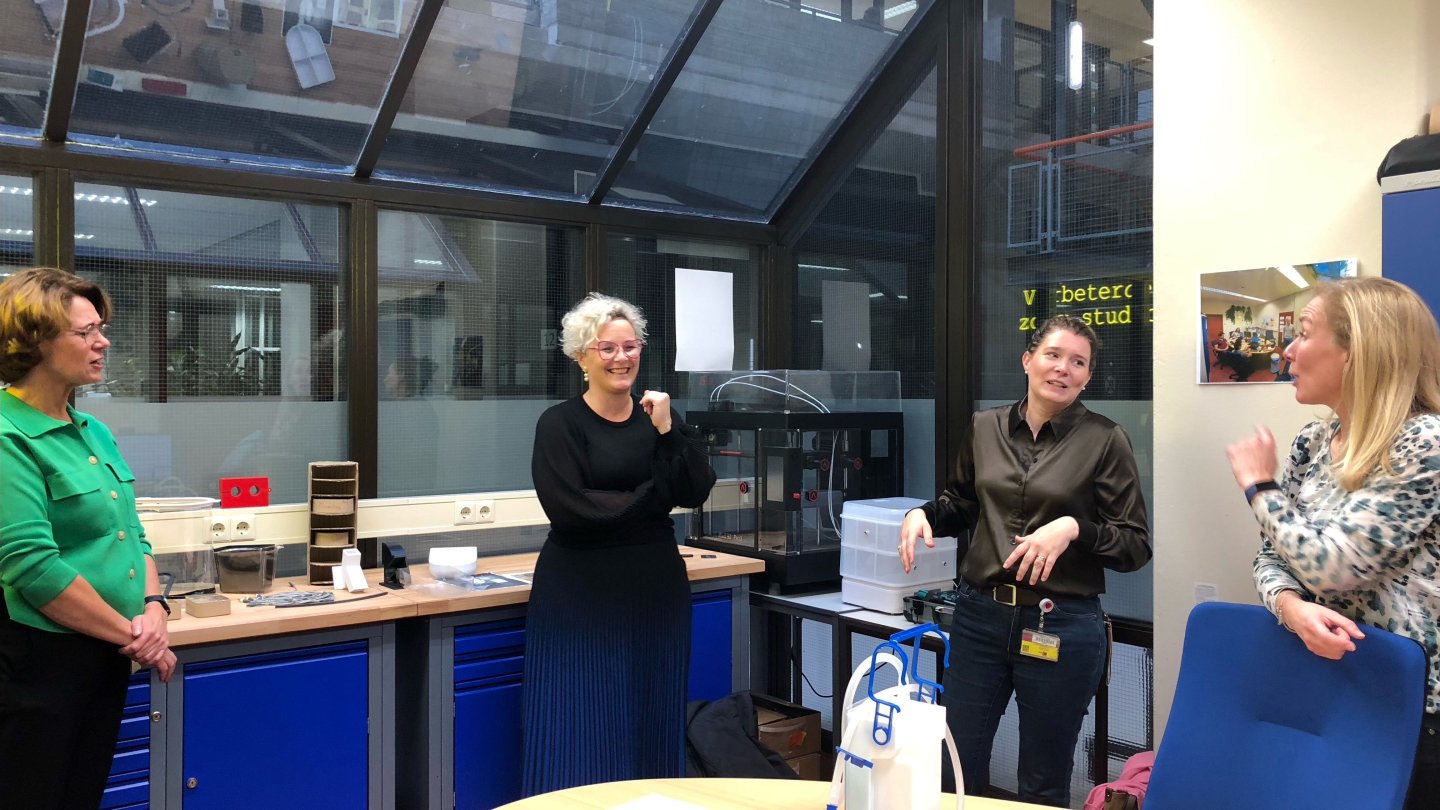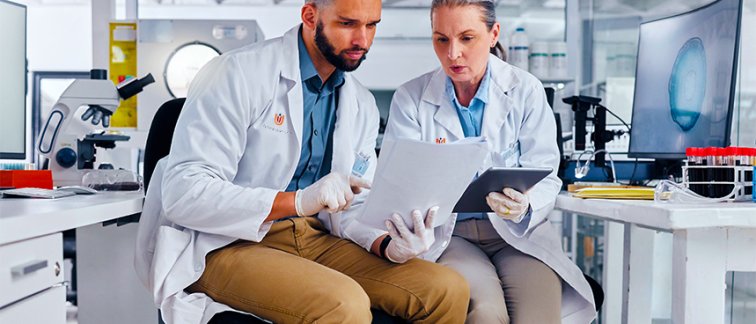What does optimal care entail for patients with rare or highly demanding cancer treatments in the Amsterdam region? Member of Parliament and nurse Wieke Paulusma visited Amsterdam UMC-Cancer Center Amsterdam to learn more about the impact of the Integral Care Agreement. This agreement aims to preserve the accessibility and affordability of care. During her visit, she attended a presentation by Prof. Sonja Zweegman who outlined the current and future organization of diagnostics and treatments for patients with hematological cancers. Prof. Zweegman tells us more about how regional care is poised to transform in the near future.
In the Netherlands, as in many countries, healthcare faces growing challenges. An aging population with an increased demand for care, coupled with rising incidence of multiple diseases, put immense pressure on the healthcare systems. At the same time, shortages of care professionals and escalating workloads exacerbate the situation. Over the recent years, mounting evidence unequivocally points to healthcare costs in the Netherlands tripling by 2060.
To address this looming crisis, the Integral Care Agreement (IZA) developed by the Ministry of Health, Wellbeing and Sports was signed a year ago by many stakeholders involved in healthcare, including the 8 Dutch university medical centers (UMCs). The agreement outlines strategies to maintain high-quality care that is both accessible and affordable.
One of the key aspects of the IZA agreement is the concentration of high-complexity, low-volume oncological care at UMCs. This involves care for a relatively small group of patients with rare cancers requiring highly specialized medical expertise.
Prof. Sonja Zweegman, head of the Hematology department and vice-chair of Cancer Center Amsterdam, emphasizes the significance of concentrating specialized care at UMC expertise centers. “Concentrating specialized care improves the quality of care. That’s been proven. However, not all aspects of the treatment process need to occur at a specialized center. Patients can benefit from receiving less specialized care closer to their home, when suitable, through regional hospital involvement.”
Coordination of Patient Care with Regional Hospitals
Prof. Zweegman highlights the crucial role that UMCs play in coordinating regional care, an initiative supported by the Ministry of Health, Welfare, and Sport (VWS). “A joint regional network is necessary for this! Through knowledge sharing among hospitals and UMCs, the new and complex care of today can be given to many more patients in hospitals tomorrow, promoting sustainability.”
For example, certain treatment steps, like those in autologous stem cell transplants (ASCT), which involve a patient’s own stem cells, have been successfully transferred from Amsterdam UMC to regional hospitals. “Several years ago, the entire ASCT therapy trajectory took place at Amsterdam UMC. However last year, 90% of ASCT patients were transferred from Amsterdam UMC to a participating regional hospital for follow-up care. This shift was made possible by a collaborative regional program we developed.”
Furthermore, the reverse patient route is now possible, with patients sometimes referred from regional hospitals to UMCs for specific new treatments or clinical trials with unregistered medications. Prof. Zweegman: “New innovative treatments, often based on our research, are regularly tested in clinical trials conducted at UMCs. With the seamless regional care approach we are developing, qualifying patients can now be referred to a UMC to receive the latest treatments. We are also working on initiative that will result in more trials taking place at the regional hospital itself.”
But optimal care for patients with cancer in the region is more than just coordinating treatments among regional hospitals. Comprehensive diagnostics play a pivotal role. “UMCs perform complex and technically challenging diagnostics that are not widely available. These require expensive infrastructure and highly skilled professionals – including specialized laboratory analysts, molecular biologists, and data analysts – who can correctly interpret the data together with the treating physicians.”
Prof. Zweegman cites advancements in DNA diagnostics as a prime example, which provides a detailed analysis of a cancer cell’s DNA. “In the past, we looked at the appearance of whole chromosomes with a microscope to investigate and diagnose specific cancers. Now, we can categorize cancer subtypes, and even identify appropriate targeted treatments, based on the precise reading of the DNA. This knowledge and expertise is all available under one roof at a UMC.”
While state-of-the-art diagnostics can be beneficial, a complex diagnostic route is not appropriate for all patients. Prof. Zweegman: “At our department, we practice what we call ‘integral diagnostics’. This means that we carefully assess the patient’s clinical data and determine morphological features of the cancerous cells by microscopic analysis. Based on this assessment, we determine if pursuing additional complex diagnostic tests are necessary.”
Seamless Regional Care
Professor Sonja Zweegman sheds light on the concept of seamless regional care, highlighting its significance in modern healthcare. Unlike traditional "third-line care," where UMCs become involved only during later stages of a disease, seamless care reimagines patient journeys.
“In seamless care, the concentration of complex diagnostics at UMCs does not necessarily mean that UMCs exclusively handle all patient cases in person,” Prof. Zweegman explains. “Instead, involved patients are typically discussed in regular digital ‘regional multidisciplinary consultation meetings (MDOs)’ involving various medical professionals. In these meetings, our department’s role (for example) is to examine blood and bone marrow of patients with hematological cancers. After a diagnosis is established, we advise on the most suitable treatment location: either at the regional hospital, if possible, or Amsterdam UMC when specialized care is required.”
This shift toward seamless care promotes earlier and more targeted disease assessments. Prof. Zweegman emphasizes the urgent need for clarity when dealing with life-threatening diseases, especially from the patient’s point of view. By reducing fragmentation across different laboratories during the diagnostic process, this approach minimizes redundant research efforts and unnecessary use of complex diagnostic tests. The result, says Sonja, is a lighter burden on patients, quicker clarity about disease status, better informed treatment decisions, and cost savings.
Reimbursement Requisites, Close Collaborations, and Data Exchange
The transition to seamless regional care is not without considerable challenges. Prof. Zweegman points to the current healthcare reimbursement system, which is tied to a 'diagnosis-treatment combination (dbc),' as an example that hampers the implementation of this model. “Reimbursement of diagnostic costs by health care insurers is closely linked to specific hospitals and treatment, meaning these costs cannot be reimbursed separately from the treatment trajectory at a defined hospital. This complicates the utilization and integration of UMC diagnostic expertise.”
Another critical factor is the need for close cooperation with hospitals in the region. To effectively concentrate and distribute care, as outlined in the IZA, data exchange among treatment centers and medical professionals is vital. This not only ensures optimal patient care, but also facilitates research.
Anticipating Change
Prof. Zweegman acknowledges that the transition to seamless regional care is a significant change with far-reaching consequences. “Patients, healthcare providers, educational programs, medical internships, and scientific research – everything will be impacted. While the benefits we can achieve in patient care and healthcare sustainability are beyond doubt, we must be mindful and not rush to create this new landscape. Transformations like this take time.” She emphasizes the importance of a deliberate and thoughtful approach that considers the human aspects affected by change to avoid potential negative impacts on healthcare, education, and research.
For more information, contact Prof. Sonja Zweegman.

Member of Parliament Wieke Paulusma in the center of the picture at Amsterdam UMC.
This article was based on ‘Gespecialiseerde diagnostiek door umc’s geeft patiënten sneller duidelijkheid’. Text by Henri van de Vrugt.
This article was created for Cancer Center Amsterdam.
Follow Cancer Center Amsterdam on LinkedIn & Twitter / X.

